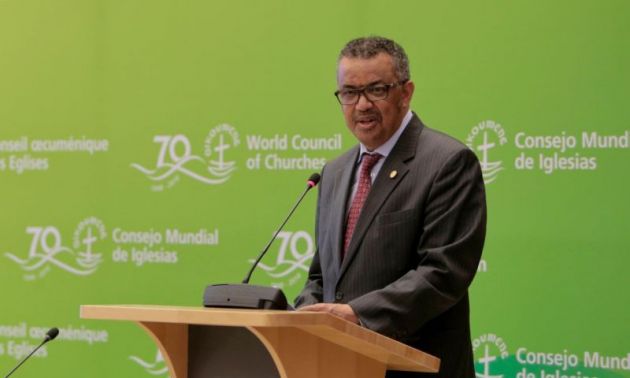World churches' grouping and global health body commemorate 50 years of collaboration

Faith and health are close companions globally and in Geneva, an international city where the World Council of Churches and the World Health Organization live cheek-by-jowl in the same sector of the city.
The two organizations are this year celebrating 50 years of collaboration.
According to the WCC, their work together includes strategizing, publications, seminars, webinars, and responding to crises such as HIV, the Ebola outbreak, and COVID-19 pandemic.
On April 7, World Health Day, the WHO celebrated its 76th anniversary—and for 50 of those years, WHO has worked closely with the WCC. Both have their headquarters placed nearby in Geneva, the European base of the United Nations..
"Our shared work in the areas of public health, promoting health, keeping the world safe, and serving the vulnerable so that more people benefit from universal health coverage has led to many achievements as well as the discovery of more challenges ahead," said WCC general secretary Rev. Jerry Pillay.
The WCC cited specific issues of collaboration having included primary healthcare, promotion of breastfeeding, access to essential drugs, addressing HIV, and addressing pandemics and outbreaks such as EBOLA and COVID-19.
The WCC said it is planning an online conference in June to celebrate the relationship.
That meeting will explore how the contributions of faith communities can be further strengthened, particularly through the new WCC Commission of the Churches on Health and Healing.
The WCC created the Christian Medical Commission in 1968 to help its 352 member churches encourage church-related health programs to develop ecumenical cooperation.
The WCC bring together more than 500 million Christians and its member churches can be found in all regions of the world.
The memberships includes most of the world's Orthodox churches (Eastern and Oriental), as well as African Instituted, Anglican, Assyrian, Baptist, Evangelical, Lutheran, Mennonite, Methodist, Moravian, Old-Catholic, Pentecostal, Reformed, United/Uniting and Free/Independent churches, Disciples of Christ and Friends (Quakers).
CHRISTIAN MEDICAL COMMISSION
In its early years, the WCC's Christian Medical Commission emphasized the promotion of primary health care to redress the imbalance between sophisticated and expensive institutional medical care for a few—and hardly any for the rest.
The relationship between the WCC and WHO officially began when the newly formed WCC Christian Medical Commission held two conferences to examine the role of the church in providing healthcare through medical missions.
"What followed was a theologically informed shift from hospital-based tertiary care in cities, many in post-colonial settings, to primary care delivery in rural as well as urban communities," said the WCC.
"A close relationship between the leaders of the Christian Medical Commission and the WHO facilitated a parallel and equally radical shift in the WHO's strategy, from a vertical or top-down focus on single diseases to the 1978 Declaration of Alma Ata (now called Almaty).
These focused on primary care.

Both the WHO and the Christian Medical Mission saw primary care as a more just and egalitarian way to distribute resources and bring health to all.
At that time, primary health care was considered a radical approach to health services.
The Christian Medical Commission, working through WCC churches, greatly enhanced the case for primary health care within WHO and its subsequent support by nongovernmental organizations concerned with community health.
ALMA ATA DECLARATION
Key in the history of the WCC and WHO collaboration was the Alma Ata Declaration, which stated: "Governments have a responsibility for the health of their people which can be fulfilled only by the provision of adequate health and social measures."
The declaration was adopted at the International Conference on Primary Health Care, Almaty, Kazakh Soviet Socialist Republic, in what was then the Soviet Union.
Another strongly collaborative area is the response to HIV and AIDS, which the ecumenical movement has highlighted since the 1980s.
In June 1986, a WCC group recommended three main areas where the churches could respond: pastoral care, social ministry, and education focused on prevention.
Educational material was produced that aimed to equip health workers, pastors, and teachers to assist communities in facing the HIV and AIDS epidemic.
Further efforts have focused on theological and ethical reflection on aspects of the church's responsibility in responding adequately to the crisis.
In 1994, the WCC study on AIDS was commissioned by its main governing body between assemblies and its central committee, and in 1996, the statement: "The Impact of HIV/AIDS and the Churches' Response" was adopted.
Marianne Ejdersten, WCC director of Communication, expressed her gratitude for being able to meet with WHO colleagues to prepare to celebrate achievements in June and look into the future.
"We have learned from the past years, with the COVID-19 pandemic, the importance of strengthening the collegial networks and the communication across the globe," she said.
Ejdersten said that from a professional communication perspective, such as during the COVID pandemic it's not very different from other crises to handle the communication setup.
"It represents an extraordinary situation where people's lives, health, and livelihoods are at stake and you have to reach out with relevant and timely information immediately, and at the same time tackle misleading information and even misleading theology," she noted.